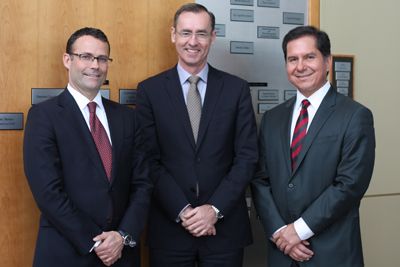
Against the background of escalating conflict between Aboriginal justice issues and the economy-driven push for resource development in Canada, Queen’s Law students had an opportunity recently to hear the views of two First Nations alumni in leadership roles. A strong message from both was to study the context.
Blaine Favel, Law ’90, the only aboriginal CEO in Canada’s oil and gas industry, delivered a talk entitled “Challenges with Reconciling Aboriginal Interests and the Canadian Economy: An Energy Perspective.” Favel is Chancellor of the University of Saskatchewan, Executive Chairman of Calgary’s One Earth Oil & Gas Inc., a Harvard MBA grad, and a former Chief (1994-98) of the Poundmaker Cree Nation in Saskatchewan.
Prefatory remarks were made by David Sharpe, Law ’95, a member of the Mohawks of the Bay of Quinte, who chairs the First Nations University of Canada and is COO and CCO of Bridging Finance Inc. Favel’s topic, he told the students, “goes to the heart of every society’s well-being, whether native or non-native, and that’s an economy that supports a good life for its citizens.” Sharpe’s own remarks emphasized that reconciliation between Aboriginal communities and Canadians in general means sharing the wealth of natural resources within an understanding of the social history and context of Aboriginal rights and treaties.
The continuing impact of colonization upon indigenous peoples, he contends, is neither well explained nor fully understood in mainstream society; it’s this failure to grasp where native peoples are coming from that makes talks about “reconciliation via economics” very difficult.
Favel moved the discussion towards another area of difficulty: the economic impact (including the world’s lowest oil prices) that results when the government-driven push for pipeline development is opposed by many affected Aboriginal communities. He explained to the future lawyers “the disconnect” between the government’s legal obligation to confer with Aboriginal peoples and the legal framework for native rights and titles developed over the past decade in Canada’s highest courts. From Favel’s rare perspective – aboriginal, corporate and legal -- the law has gotten ahead of politics and ahead of large sections of the resources industry.
If the government were to “deal cohesively” with First Nations issues in order to resolve pipeline disputes, he is optimistic that it would mean billions of dollars for the Canadian economy by 2030. It would also involve a lot of lawyers. As he told his audience, “If your legal career is in securities law, corporate law, or litigation, there is no doubt you will bump up against First Nations issues and aboriginal rights.”
For insights into the context both alumni spoke of, the following article from the Guardian is recommended: “Rights-Based Aboriginal rights a threat to Canada's resource agenda, documents reveal.”